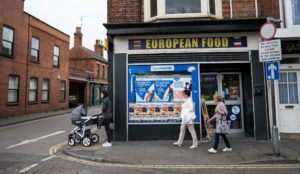I spent the run-up to Brexit waddling around my small town with a large baby bump, delivering Vote Leave campaign leaflets. As I explained to friends who wondered why I was campaigning for something so obviously daft, I did so because I felt that it was wrong that EU membership had removed key policy areas from electoral influence.
The result had been, I felt, leaders on autopilot, and a waning capacity for self-government. It might be too late to reverse this trajectory, but those of us who take civic nationalism and engaged democratic politics seriously ought to try.
This was the message condensed into the successful Vote Leave campaign message: “Take Back Control.” So there I was, doing my bit for an exercise in mass democratic engagement. We all know what happened next. Like my daughter, the Leave victory is now six years old. So how’s it going? Have we taken back control? Leaving aside Covid and the wrangling over how (or whether) to leave, there’s one clear measure where we can assess our leaders’ scorecard on returning democratic accountability to the British electorate: immigration.
If for me, supporting Leave was about democratic accountability, for many Brexit voters it was much more practical. Thanks to EU free movement rules, many felt the level of low-skilled immigration to the United Kingdom was too high, depressing wages. Many Leave voters sought to return immigration to British national control, in the hope that politicians would then use the powers they now possessed to lower immigration in line with the desires of voters.
On this metric, Brexit has spectacularly failed. ONS statistics this week are expected to show that net migration has in fact more than doubled from the pre-Brexit level of 336,000 to over 700,000 in 2022. Some are predicting net migration for a single year could top one million. In the wake of these revelations, just 9% of Brexiters believe Brexit has been a success.
Where, then, is the “control” the Brexit campaign promised could be taken back? In truth, the real question this raises goes deeper than whether or not political leaders have betrayed their voters since 2016. It’s a question that was raised, or at least gestured at, by many at last week’s National Conservatism conference in Westminster, to shrill horror from the self-appointed Virtuous People in the press. Namely: what even is a nation? What, and who, is it for?
If you’d asked me this question while I was waddling around small-town England in 2016 with a bag of “Take Back Control” leaflets, I’d have said something to the effect that nation states are the generally-accepted modern scale for the governance of a people in a particular place. That in modern times this governance usually (though not always) happens via some form of electoral democracy. I might have added that nations tend to map partly, though not exclusively, onto a culture, language, and history — and that over time they often have a reciprocal structuring effect on that people’s idea of themselves as a collective with common interests.
I might have said that the history of patriotic feeling that attends this marriage of language, culture, history, geography, and democratic citizenship is sometimes criticised for its propensity to spill over into chauvinism or hostility toward outsiders. But that we should set this against the fact that to work for its citizens, as a democracy, a self-governing nation must have a sense of who is and is not a citizen, and what if anything is due only to, or expected only of, those citizens. And, at the most concrete level, everyone there needs a good idea of where this applies: in other words, a nation needs clearly marked geographical boundaries.
Everything I did in 2016 was predicated on these things still being true and the proper way to govern a place. But though it gives me no pleasure to say so, and though I was a speaker at last week’s National Conservatism conference, I’m no longer sure this is the case. My worry is structural: that the nation-state form as such is now desired only by those at the bottom of the social scale, and no one with an iota of power cares what they think. Worse still, no one with an iota of power even cares who they are, or what nation they do or don’t in principle belong to.
The whole point of a democratic nation state is that we agree who The People are and what The Place is, and that we agree to abide by the electorate’s decisions (with some qualifications) on important matters concerning that people and place. But this week’s numbers reveal that the Tories, despite routinely making hostile noises about immigration, are not listening. They’re determinedly deaf to the majority view among Britons that immigration is too high: a view held by 57% of voters overall and 75% of Conservatives: so much so, that the Cabinet recently blocked all but one of Suella Braverman’s proposals for lowering it. And as pollster Matthew Goodwin set out last week, this is hardly the only policy area in which the Tories are obdurately cloth-eared.
Meanwhile, if the meaning of “listening” is ambiguous where the Tories are concerned, for Labour so too is the meaning of “electorate”. The week before NatCon, Keir Starmer floated a proposal to extend UK voting rights to tax-paying EU citizens living in the UK, as well as to sixth-form schoolchildren. In other words: citizenship doesn’t imply a bond of belonging or loyalty, but is instead more like a gym membership. Anyone who pays the subscription can join. And perhaps this doesn’t matter, because clearly the franchise doesn’t do much. Otherwise Starmer wouldn’t be proposing to extend it to children deemed too young to buy cigarettes.
In other words: if you ignore what our leaders say, and watch what they do, it’s clear that there is now very little elite support for the geographically- and politically-bounded, democratically-governed nation state that Brexit voters sought to defend. One party harrumphs about “boat people” while treating the UK’s physical borders as an obstacle to growing the economy. Meanwhile, the other party cheers this on, albeit purportedly for humanitarian reasons, and views the franchise as obsolete, too: little more consequential than a Strictly phone-in. But perhaps this is to be expected. We’re some distance beyond Britain’s industrial era now. And I’m not sure you can have democratic nation states in a post-industrial country: for the idea of mass democratic participation as such only came into being with the urbanisation and industrialisation of working people.
For most of 19th-century Europe, as A.J.P. Taylor shows in his classic 1941 history, for example, much of the land between Italy and Russia was governed by the Habsburg dynasty. In these territories, a dizzying array of languages, national cultures, and class interests interpenetrated. Under those circumstances, nation states simply weren’t a thing in the modern sense. With Habsburg rule as a kind of political emulsifier, shared linguistic or class interests sometimes weighed more heavily than geography. The Habsburg territory known as Bohemia, for example, is now part of the Czech Republic but also contained (among others) Poles, Hungarians and a great many German-speakers, a fact that Hitler used to justify its annexation in 1938.
It was industrialisation, and with it the bleeding of power from the ancient aristocracies, that drove the shift from these more porous polities toward nation states as we know them. Wealth bled from farming towards mercantile elites. Tractors replaced peasants, who flocked to the cities and demanded industrial work. And many of the disputes in this turbulent age turned on such contests of power, between the old, landed gentry and newer centres of power.
Critics of last week’s NatCon conference often treat liberalism and nationalism as antonyms — but this would have made no sense two centuries ago, when the liberals were the nationalists. When students took over Budapest in the 1848 revolution, for example, what they demanded was not a million miles from what most Brexiters wanted: a voice, in a defined nation bounded by geography and citizenship rather than elite privilege or nativism. That is, in A.J.P Taylor’s words, “a democratic constitution with universal suffrage […] and equal rights for the nationalities”.
At this point in the story, such political possibilities were just emerging. Writing on Christopher Clark’s new history of 1848, Revolutionary Spring, Daniel Zamora Vargas shows how this period also saw the emergence of the public political sphere— and with it, of the kind of engaged mass polity without which you can’t really have a democracy in the sense Brexiteers sought to preserve. It was, Vargas suggests, the inception-point for “political parties capable of disciplining their members” and of “binding them to commonly agreed positions”. In the wake of this febrile time, he writes, “the emerging working class would progressively work through parties, unions and strikes rather than coups d’états and barricades”.
In his forthcoming book End Times, the political scientist Peter Turchin describes a similar — though less chaotic — process of electorate-formation in 19th-century Britain. As Turchin describes it, the mid-19th century in Britain saw a “messy” negotiation between the old landowning aristocracy, emerging mercantile elites, and working-class people, over what was due to whom. This culminated in the overturning of protectionist measures for British farming, reform to welfare provisions for the poorest, and in 1867 the Second Reform Act which granted all adult male property owners the vote. And it was in the course of that negotiation that the British polity became aware of itself as such: a trajectory that would culminate, in the early 20th century, in the universal franchise.
In other words, the age referenced by National Conservatism — the age of nation states — has its beginning point in the push first by the landless bourgeoisie and then by the industrial working class for a political voice within modernity. But we might also argue that it had its end point in two global conflicts between the resulting nation states accompanied by an orgy of industrial hyper-productivity, via total civilian mobilisation for munitions manufacturing.
Since then, we’ve been living in the ashes of the nation state order. Having read Taylor since 2016, I now understand a little better why the nations of Europe might respond to that catastrophe by seeking to replace the clearly somewhat combustible nation state format with the EU: a new emulsifier, with clear structural echoes of the Habsburg empire. Britain was never part of that empire, so it’s perhaps unsurprising that many in the British Isles should view this as an alien imposition. But it’s not as though we can return to the material conditions of the Habsburg age either, however wishfully the “post-liberals” may imagine doing so.
Our situation now is a troubling one: a Europe that is largely post-industrial and, at least as far as its elites are concerned, functionally post-national. And this means, in the terms that emerged during the industrial era, post-democratic. For if working people gained a voice by dint of being indispensable to manufacturing, events since Brexit demonstrate that they may safely be ignored now high finance has replaced making things, without the wheels coming off the state.
Thus emancipated from any meaningful working-class ability to hold their feet to the fire, it’s all too predictable that those in a position to do so should opt for what Turchin calls the “wealth pump”: that is, abandoning rule for the public good, in favour of pursuing their own narrow class interests. In this case, that means turbo-charging finance and property via mass immigration, while running social solidarity infrastructures into the ground, and looking to others of the same post-national class for political, cultural, and ideological solidarity as they do so.
It’s hard to say for sure what forms of large-scale governance will emerge from this febrile situation. A considerable amount of power is already vested in international governance and NGO networks, for example, while capital has been radically post-national for some time. Meanwhile, the masses who once found a voice in aggregate via electoral politics, in the bounded nation state, are on their way to being as radically disempowered as prior to the franchise.
The fact that one side emits platitudes about “the most vulnerable in society”, and the other invokes the aesthetics of the nation state past, is neither here nor there. The nation is over. But the reaction is just beginning.
Disclaimer
Some of the posts we share are controversial and we do not necessarily agree with them in the whole extend. Sometimes we agree with the content or part of it but we do not agree with the narration or language. Nevertheless we find them somehow interesting, valuable and/or informative or we share them, because we strongly believe in freedom of speech, free press and journalism. We strongly encourage you to have a critical approach to all the content, do your own research and analysis to build your own opinion.
We would be glad to have your feedback.
Source: UnHerd Read the original article here: https://unherd.com/







